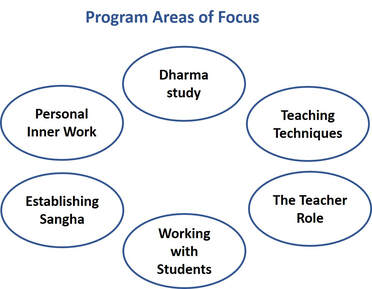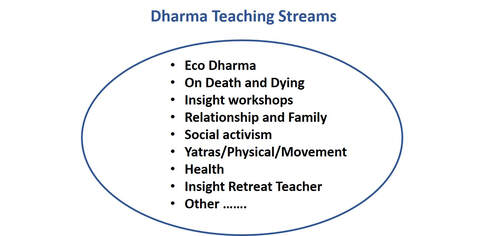Insight Dharma Teacher Training and Mentoring Program
The Insight Dharma teacher training and mentoring program offers a 4 to 6 year pathway to deepen insight and awakening and to develop the skills and understanding for teaching the Buddha Dharma.
The Dharma teacher training group will be a small, selected group of students with ten or more years background in meditation. Primarily a trainee teacher is invited by a senior Insight Dharma teacher who refers the trainee teacher to the Institute via a letter of recommendation. Potential trainee teachers can self nominate and be interviewed by two teachers on the Institute's faculty to assess their eligibility. Students will be selected for the Dharma teacher training program based on their: depth and length of practice, Dharma insights, maturity, compassion, teaching ability, communication skills and commitment to teaching the Dharma.
The program comprises: systematic study of Buddhist texts, extensive training in meditation practices and techniques, working effectively with individuals and groups, ethical guidelines for teachers and understanding the teaching role.
It includes working closely with a senior Insight Teacher as their mentor, assisting on retreats, giving talks, instructions, leading days of mindfulness and supporting sanghas as preparation for assuming full Insight Meditation Dharma teacher status.
New Training starting early 2025. Enquiries are welcome.
- Workshop/retreat - dates to be announced
- One day events during the year on line from 10am to 4pm on: dates to be announced
- Dharma study groups with selected teachers
- Supporting retreats and/or training programs
- Individual mentoring with your nominated Senior teacher
Tuition Fee: Following in the tradition of the Buddha, all tuition provided in this Insight Dharma teacher pathway both by the Institute and by our senior teachers/mentors is being offered on a Dana basis.
Program Content:
The Insight Dharma teacher training and mentoring program offers a 4 to 6 year pathway to deepen insight and awakening and to develop the skills and understanding for teaching the Buddha Dharma.
The Dharma teacher training group will be a small, selected group of students with ten or more years background in meditation. Primarily a trainee teacher is invited by a senior Insight Dharma teacher who refers the trainee teacher to the Institute via a letter of recommendation. Potential trainee teachers can self nominate and be interviewed by two teachers on the Institute's faculty to assess their eligibility. Students will be selected for the Dharma teacher training program based on their: depth and length of practice, Dharma insights, maturity, compassion, teaching ability, communication skills and commitment to teaching the Dharma.
The program comprises: systematic study of Buddhist texts, extensive training in meditation practices and techniques, working effectively with individuals and groups, ethical guidelines for teachers and understanding the teaching role.
It includes working closely with a senior Insight Teacher as their mentor, assisting on retreats, giving talks, instructions, leading days of mindfulness and supporting sanghas as preparation for assuming full Insight Meditation Dharma teacher status.
New Training starting early 2025. Enquiries are welcome.
- Workshop/retreat - dates to be announced
- One day events during the year on line from 10am to 4pm on: dates to be announced
- Dharma study groups with selected teachers
- Supporting retreats and/or training programs
- Individual mentoring with your nominated Senior teacher
Tuition Fee: Following in the tradition of the Buddha, all tuition provided in this Insight Dharma teacher pathway both by the Institute and by our senior teachers/mentors is being offered on a Dana basis.
Program Content:
|
The goal of the program is to support participants to develop the depth of understanding, realisation and confidence to become skilled Insight Meditation teachers in whichever Dharma Teaching stream they undertake. And to be acknowledged as an Insight teacher by their mentor, the insight meditation institute and by the wider community of Insight Dharma teachers in Australia and New Zealand. |
Traditionally the label Insight teacher has mostly referred to an Insight Meditation Retreat teacher. We acknowledge and indeed support the reality that there are many ways that the Dharma can be taught and made relevant in different contexts other than the meditation retreat format.
In this program the emerging Dharma teacher is encouraged to follow their interest in their teaching and expression of the dharma. The various teaching streams we envisage include but are not limited to the following:
In this program the emerging Dharma teacher is encouraged to follow their interest in their teaching and expression of the dharma. The various teaching streams we envisage include but are not limited to the following:
The Program Focus Areas in Detail:
Dharma Study
Personal Inner Work
Establishing Sangha
Dharma Study
- Various Buddhist texts as well as selected suttas from Middle Length discourses, Sutta Nipata and Dharmapada
- Basic Dharma Principles and study of the: 4 Noble Truths, 4 Foundations of Mindfulness, 3 characteristics of existence, 4 Brahma Viharas, 8-Fold Path, 7 Factors of Enlightenment, 5 hinderances, Jhanas, Dependent Arising, Virtues & Paramitas, the Depth of the Middle Way teachings
- Enlightenment: What is awakening? Four Noble stages, Consciousness, Liberation and the unconditioned
- Buddhist Psychology - Mind/body experience (Nama/Rupa) 6 sense doors
- Teachings on karma, past lives, realms, Buddhist stories
- Comparative Buddhism - texts & practices – Theravada, Mahayana, Vajrayana
- Non-dual teaching in Theravada, Advaita/ Dzogchen/ Zen
- Contemporary Theravada - Masters/Lineages: Achaan Chah, Achaan Buddha Dasa, Bhikkhu Bodhi, Bhikkhu Analayo, Joseph Goldstein, Jack Kornfield, Tara Brach, Christopher Titmus
- Engaged Buddhist principles and teachings, Eco-dharma, Peace & Social activism
- Instructions for Insight guided meditations: Working with breath, body, sound, sensations, feelings, mind and choiceless awareness
- Concentration practices - How to know which are best?
- Dharma talks - how to create, organize, draw from tradition and own experience. Discussion on many styles. What is essential in creating a body of talks?
- Providing skilful guidance to individuals and leading small groups?
- Training of the Mind - Samadhi - Mindfulness of mind, it’s uses and misuses, ways to work and develop depth and focus
- Training in large group Dharma Inquiry
- The 4 Brahma Viharas – ways to teach heart practices and their relation to mindfulness
- Teaching and guiding visualisations
- Body centred practices - somatic practices
- Teaching Right effort, striving vs relaxation, Renunciation - the art of letting go
- The role of faith and devotion
- Uses of ritual/sacred container
- Coming into the teaching role – serving the Dharma, oneself and students
- Relating to the ‘students’
- Transference, boundaries ambition and accountability
- Relationship to lineage/elders/tradition
- Relationship to Buddha
- Finding one’s own voice, finding one’s place
- The role of becoming a ‘spiritual director’
- Dynamics of community/sangha in general
- Isolation / teacher colleagues and community
- Relationship with other teachers and co-teachers
- Receiving and giving feedback
- Diversity – race, class, different orientations
- Male/Female issues
- Monastic/lay issues
- Sexuality and Eros -- how to handle/address
- Vows, Precepts and ethics for teachers
- Engaged Buddhism - Justice, wars, politics, environmental issues
- Dana philosophy and the spirit of generosity in practice. Money, support issues, consumerism, donors, wealth
- Power issues/authority issues/shadow
- Scheduling – exhaustion/renewal
- Supporting students to deepen their practice on a pathway of awakening
- Supporting students in cycles of practice, integration, emotions and stuck places
- Supporting students in their personal work in a Dharmic way, with family history, body & health / emotions / livelihood / integration in Dharma community, etc.
- How to recognise and respond to trauma
- Working with difficult psychological history of meditation
- Dealing with spiritual Emergencies
Personal Inner Work
- Ongoing mentoring, supervision and accountability
- Deep sharing of: realisations, beliefs, doubts, past practices, values, problems, strengths and weaknesses and Dharma vision
- Inquiry into and transforming one's personal psychological patterns .
- childhood/psychological issues/patterns
- spiritual/personal goals
- sexuality/relationship
- family history - current family life
- Buddhist superego
- money/livelihood
- shadow - positive/negative projections
- narcissism and humility
Establishing Sangha
- Establishing and leading a sangha
- Principles of an insight meditation Sangha - egalitarian principles, lay and family practice, gender equality, inclusiveness, democratic processes, autonomy
- Understanding group formation and group dynamics
- Managing group dynamics
- Community administration
- Working with conflict/discord. Grievance procedure policies
insightmeditationinstitute@gmail.comContact us by please here email : insightmeditationinstitute@gmail.com
Proudly powered by Weebly


